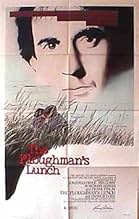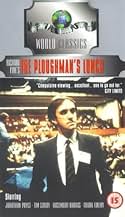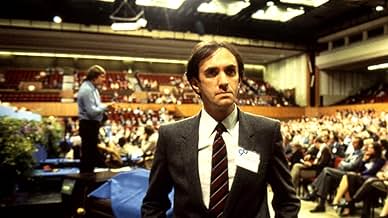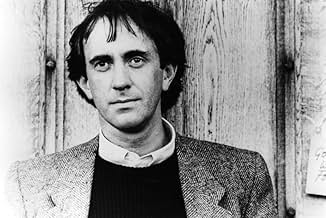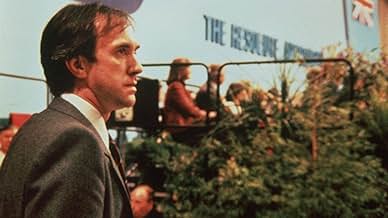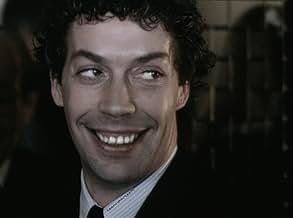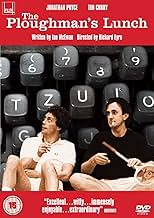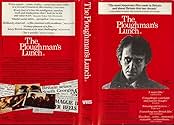James Penfield (Jonathan Pryce) has made a career out of journalism. Now bankrupt, he finds himself with a group of other writers in the middle of the dispute-ridden British homeland at the ... Read allJames Penfield (Jonathan Pryce) has made a career out of journalism. Now bankrupt, he finds himself with a group of other writers in the middle of the dispute-ridden British homeland at the time of the Falklands War.James Penfield (Jonathan Pryce) has made a career out of journalism. Now bankrupt, he finds himself with a group of other writers in the middle of the dispute-ridden British homeland at the time of the Falklands War.
- Nominated for 1 BAFTA Award
- 1 win & 1 nomination total
Robert Cartland
- Editor
- (as Bob Cartland)
- Director
- Writer
- All cast & crew
- Production, box office & more at IMDbPro
Storyline
Did you know
- TriviaPart of this movie, towards the end, was set at the Conservative Party annual conference in Brighton in 1982, and was actually filmed at that event. In one shot at the conference, Penfield is seen lighting a cigarette amongst a crowd of conference delegates, and just behind his right shoulder is John Major, who succeeded Margaret Thatcher as Prime Minister.
- GoofsThe film gives thanks to "The Women of Greenham Common," who presumably inspired the peace-camp near where James Penfield (Pryce) gets his flat tyre. The Greenham women's peace-camp had indeed been the first of its kind, near Newbury in Berkshire, and very newsworthy in the early eighties, both for its feminist leadership and its unmovable resistance to the stationing of nuclear weapons - part of NATO's nuclear umbrella initiative - on a site of formerly common land.
However, this would be an entirely illogical route for Penfield to have taken back to London (even to TV studios in W12). He would have had to skirt London anticlockwise to the West on a ninety minute spiral detour along relatively minor roads (the M25 had huge sections yet to be constructed, whilst the M11 was already a swift route from Cambridgeshire toward Central and West London and/or Brixton).
Far more appropriate, given Ian McEwan's strong sense of geographical location, would be a similar peace-camp then starting up just outside RAF Lakenheath near Thetford in Norfolk. Penfield's route from the North Norfolk Coast (by then already popular with arty types seeking a bolthole away from London) would have taken him right past the perimeter early on. From footage of the jets taking off, and the stated fact that the film was "filmed entirely on location in London, Brighton and Norfolk," this seems likely to be the actual location for the filming of that scene.
- ConnectionsReferenced in No 73: The Disagreement (1983)
Featured review
Always intelligent, but hardly cinematic, this is certainly an interesting film, but not fully entertaining.
I saw it on release and again for the second time this week and the lasting impression is a dog's dinner of ideas. At the centre there is a doomed romance, overlaid with a smorgasbord of messages inter-weaved in the script.
I shall attempt to list these message here.
a) The long term decline of Britain's importance in the world, b) the folly of the Suez expedition and a sort of oblique parallel with the Falklands War which doesn't work - Suez was a disaster, the Falklands campaign successful, c) the emotional toughness/nastiness of the Thatcher government, d) the Greenham Common anti-nuclear encampment (not sure what this is doing in the film), e) the lies sold by advertising, f) the bias inherent in the way we rewrite history, g) the English class system, h) the emotional coldness of journalists. Phew!
Added on to this, we have the conundrum of our hard to like hero James Penfield who wants love, but does not show it to those who love him. Crucially, he is foolishly chasing a snooty, upper (ruling) class girl whose own frivolous behaviour seems to be a comment on Britain's decline.
The real shame is that there are some fantastic parts to the film. Rosemary Harris is just perfect as the love seeking historian. And, then there is the cinema magic of filming the denouement to the central romance within the real-life setting of the Conservative Party Conference. With a few changes this film could have been up there with Performance and Brief Encounter, instead of an obscure curio of British cinema.
Details
- Release date
- Country of origin
- Language
- Also known as
- El reportero sin escrúpulos
- Filming locations
- Production companies
- See more company credits at IMDbPro
Contribute to this page
Suggest an edit or add missing content

Top Gap
By what name was The Ploughman's Lunch (1983) officially released in Canada in English?
Answer

